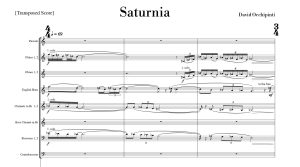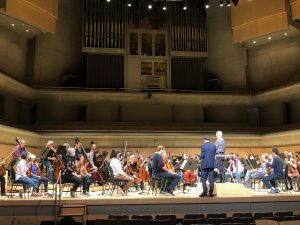CMC Ontario Regional Director Joseph Glaser sat down with David Occhipinti, a participant in the latest edition of the Toronto Symphony Orchestra’s Explore the Score program to discuss his participation in the reading session.
Since 2012, the TSO has given some of Canada’s top emerging composers an opportunity to hear their works rehearsed in a live professional orchestral setting. Presented in collaboration with the Canadian Music Centre (CMC), Explore the Score is part of an ongoing commitment to support the development of emerging Canadian composers and the creation of new orchestral works, and to offer the public a front-row seat in witnessing artistic creation first-hand. The program provides some of Canada’s promising composers an opportunity to hear their work performed in a professional orchestral setting and receive mentorship from artistic and administrative staff. The 2022 edition involved advising sessions from the TSO’s orchestral librarian Christopher Reiche-Boucher, RBC affiliate composer Alison Yun-Fei Jiang, TSO’s composer advisor Gary Kulesha, TSO’s music director Gustavo Gimeno, and guest composer Magnus Lindberg.
On October 22nd, the Toronto Symphony Orchestra read David’s work Saturnia alongside works by Coreen Morsink, Véronique Noël, and Patrick Wu conducted by Gary Kulesha.
Joseph Glaser: Tell me a little bit about your background, how did you get into music?
David Occhipinti: It all started on a cold December night in 1966….
In all seriousness I started out by listening to LPs growing up in the 70s, and the first album I got was the Beatles’ Abbey Road. That album just floored me. I was about 5 years old and it really captured me, something about the sound and harmonies just transfixed me. My parents weren’t that musical really, but I kept asking for instruments. My parents got divorced when I was eight which turned out to be a blessing in disguise. I moved in with my dad and my step-mom, who was very musical; she was an amateur singer and encouraged my love of music. I was very lucky she came into my life. They got me a piano at a certain point, and that started my musical journey. I also wanted to play guitar and ended up getting a guitar for Christmas when I was 13 and starting playing the Beatles and Led Zeppelin before getting into jazz. I started composing tunes and solo guitar pieces soon after that at around 16. My musical discovery from rock to instrumental music, to jazz and then classical music was a slow process. I learned a lot about classical compositions and composers by going to the reference library and listening to records while looking at scores. That was my composition teacher! I still go to the U of T library all the time.
When I first heard most of the music that I love now, I didn’t necessarily understand it. I experienced that with Stravinsky’s The Rite of Spring, the music of Charlie Parker, guitarist Lenny Breau, and Miles Davis. Often, a general human reaction to finding something that you don’t understand is to say “I don’t like it,” but rather than reject this music I took the course of trying to listen to it many times in order to try and understand it. This was my approach in the library, I would listen to these pieces over and over and follow along with the score. Then the music would become familiar and internalized.

JG: Can you tell me a bit about the piece and what you were going for, and did you achieve those goals?
DO: Before starting this work, I was as shocked as anybody to have received a commission to compose a fanfare for brass and percussion from the Ottawa Symphony. I started writing that piece late last year (2021) and while I was writing that piece, in the back of my mind I kept thinking “This is just the brass and percussion but, wow, imagine if I was writing for the whole orchestra!” The little kid in me got more and more excited about that prospect. So, as I was finishing writing the fanfare, I started having ideas that would be suitable for the full orchestra. Every day I would go to the piano and I’d started chipping away at it. I ended up with something around 4 or 5 minutes of music and I began orchestrating it. This was my first time writing something where I didn’t know if there would be a first performance having only ever written for myself, friends, or colleagues before. At first, I was planning on it being a 15-piece ensemble because I figured it would be easier to hire some musicians and self-fund. That ensemble is basically a small orchestra in a similar instrumentation to Stravinsky’s Renard. Then when the TSO call went out, I took my 15-piece ensemble and expanded it to full orchestra. Soon into that process I realized that that’s a lot more work than I thought it would be! In the end, it ended up not being an expansion but really a new thing that started to take on a life of its own.
One last thing I should mention about the piece is that Saturnia was the name of the ship that my father travelled on from Italy to Canada in 1952. The title has a special meaning for me. He passed away in 2015, and, he bought me my piano, so he started me on this musical journey. Even though he didn’t always approve of my chosen profession in music, I think he would have been thrilled that I called my orchestra piece, Saturnia.
JG: Can you tell me a bit about floating between jazz, pop, and classical genres as a composer? Do you find commonalities in the approach to writing, do you treat them as separate or do they inform each other?
DO: While I’ve referred to “jazz” and “rock” and “classical” here but when I’m thinking of making my own music, I just think about music. I ask “is there improvisation in this music?” – yes? Then some people might call that a jazz piece. But if you ask jazz musicians if my music is jazz, you might get a few shrugs. It’s the same thing in the classical world as well, I don’t really fit in to either genre neatly. I want to create music and my hope and desire is to create something of my own – and that’s music without any borders. My hope is to find some place for it to be performed and to be accepted. While some musicians may say that they’re all about the music and nothing else really matters, the bottom line it is nice to receive some form of acceptance. I try as much as possible to write things that are true to myself.
 JG: Describe the reading session from your perspective.
JG: Describe the reading session from your perspective.
DO: I really enjoyed meeting the other composers and getting to know [RBC Affiliate Composer] Alison [Yun-Fei Jiang] who was really supportive of my work. The feedback from [visiting composer] Magnus Lindberg was also really helpful and constructive. Everything he said was from the perspective of improving the music and not to prove a point. That’s something I really respect. The orchestra musicians were also wonderful and very receptive. I really enjoyed being able to talk with them before the read-through and getting them to laugh before my piece. That may sound superficial or trivial, but when I’ve been in the studio, I’ve found it’s really essential to have a few laughs right before a take to create a nice environment- even if it is a serious piece. I’m always trying to create an environment where, yeah, we’re taking it seriously, but we don’t want to take it too seriously. That collegial feeling definitely comes through on the recording. I’ve certainly never spoken to that many people at once so that was a bit of a thrill!
JG: Do you have any takeaways from the experience? Now that you’ve heard the work, what are some things you would approach differently for the next piece you write for orchestra?
DO: I learned a lot about orchestration and balance issues. It’s also really clear that you don’t have a lot of time in a reading session. Really, there’s not quite enough time. It’s definitely different than if they were performing it. The piece definitely would have benefitted from another half an hour rehearsal to really work on a few details. That being said, I’m really happy to have the recording.
One of the interesting things is that I’ve now been able to make changes to the score. That’s something I do in my regular practice where I have time to hear the score and make revisions. This being my first piece for orchestra, there were a few things I was unsure of and it was really helpful and eye-opening to hear them played by the orchestra. I’m very grateful for the opportunity. Now I want to do more!

